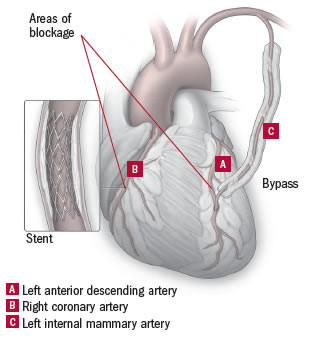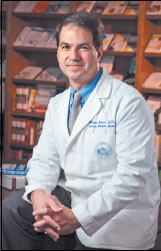
What can magnesium do for you and how much do you need?

Dry socket: Preventing and treating a painful condition that can occur after tooth extraction

What happens during sleep �� and how to improve it

How is metastatic prostate cancer detected and treated in men over 70?

Could biofeedback help your migraines?

Plantar warts: Options for treating this common foot condition

Cancer survivorship: What comes next after treatment

Nutritional yeast: Does this savory, vegan seasoning pack a nutritional punch?

Salmonella is sneaky: Watch out

Two jobs may lower the odds of dying from Alzheimer's disease �� but why?
Heart Failure Archive
Articles
Managing a leaky mitral valve
Even if you don't have symptoms, repairing the valve sooner rather than later may be a wise choice.
The four valves of your heart work like one-way swinging doors, opening and closing in a perfectly timed sequence to propel blood through your heart and the rest of your body. But the leaflets (flaps of tissue that make up the valves) and nearby structures don't always function as they should. Perhaps because of the higher pressures in the heart's left side, the valves there are particularly vulnerable to problems. That includes the mitral valve, which separates the left upper and lower chambers of the heart (see illustration).
Cardiac arrest during sports is rare, and there may be warning signals
Reports that someone thought to be "perfectly healthy" collapsed while playing sports may instill fear in middle-aged men who want to stay physically active. However, a study in Circulation found that sudden cardiac arrest (SCA) during sports activities is uncommon and is often preceded by possible symptoms of heart problems.
Researchers have tracked cases of SCA in Oregon since 2002 in adults ages 35 to 65. As of 2013, only 63 of the 1,247 SCAs they found, or 5%, happened either during or within one hour of engaging in activities such as jogging, bicycling, basketball, golf, or tennis. It occurred more often in men, although it's possible this was because the men were more likely to engage in sports than women.
Bypass plus angioplasty: The best of both worlds?
In hybrid heart surgery, the blocked or narrowed left anterior descending artery is bypassed with the nearby left mammary artery, while another blocked artery (in this case, the right coronary artery) is opened with angioplasty plus a stent. Illustration by Scott Leighton |
Known as hybrid coronary revascularization, this technique may become more widely available in the future.
The future of heart rhythm monitoring?
Small, wireless skin patches may offer a convenient way to diagnose—or rule out—arrhythmias.
An abnormal heart rhythm—when your heartbeat is too slow, too fast, or irregular—may be a fleeting, harmless event. But it might be a sign of a more serious heart condition. If you have frequent palpitations (which feel like your heart is pounding, racing, or fluttering) or unexplained fainting spells, your doctor may recommend a Holter monitor. This portable electrocardiogram (ECG) machine records your heart rhythm over a day or two.
Ask the doctor: Pacemakers and MRI scans
Q. I have a pacemaker and was told to never have an MRI scan. Is there any way around that?
A. In the past, people with pacemakers were told never to have magnetic resonance imaging (MRI), but in certain cases it may be safe.
Treating mild high blood pressure reduces heart problems
A recent study in Annals of Internal Medicine suggests that people with mild high blood pressure and no symptoms of heart disease can still benefit from taking blood pressure medication.
When your blood pressure tips above 140/90 mm Hg, most doctors suggest medication—in addition to healthy diet and exercise. The higher your blood pressure, the greater the risk of heart attacks, strokes, and death. What experts disagree on is how low you should shoot for once your blood pressure is clearly above the 140/90 threshold.

What can magnesium do for you and how much do you need?

Dry socket: Preventing and treating a painful condition that can occur after tooth extraction

What happens during sleep �� and how to improve it

How is metastatic prostate cancer detected and treated in men over 70?

Could biofeedback help your migraines?

Plantar warts: Options for treating this common foot condition

Cancer survivorship: What comes next after treatment

Nutritional yeast: Does this savory, vegan seasoning pack a nutritional punch?

Salmonella is sneaky: Watch out

Two jobs may lower the odds of dying from Alzheimer's disease �� but why?
Free Healthbeat Signup
Get the latest in health news delivered to your inbox!
Sign Up






